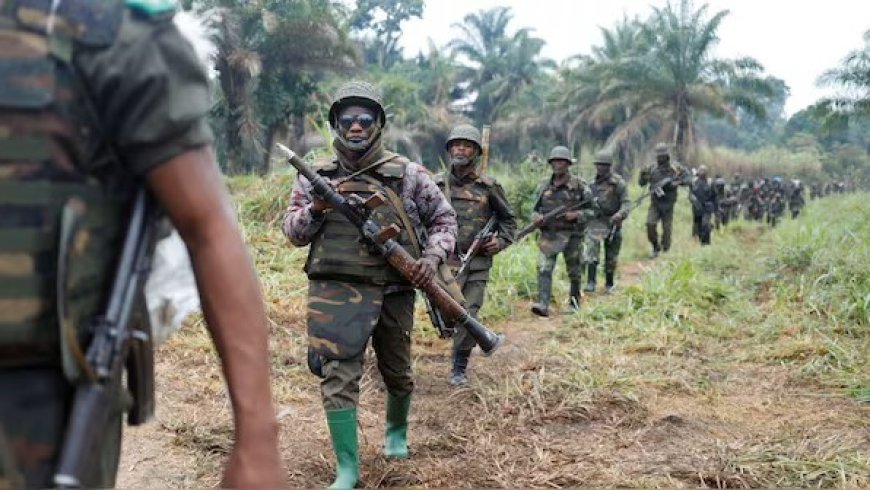POLITICS OF DRC CONGO WAR AND M23 – WHO IS SPONSORING WAR IN AFRICA?
This video discusses the ongoing conflict in the Democratic Republic of Congo (DRC) involving the M23 militia group. It explores the geopolitical implications, the involvement of various nations, and the rich mineral resources at stake, highlighting the reactions from local citizens and international entities.

In a recent episode of Geopolitics 411 Youtube chanel named GEOPOLITICTS, the host explores the escalating conflict in the Democratic Republic of the Congo (DRC), primarily driven by the M23 militia group, which is thought to have Rwanda's support. The M23 has seized key areas in North Kivu, a region abundant in valuable resources like gold, diamonds, and cobalt. The host emphasizes this conflict's geopolitical complexities and international ramifications, indicating that external interests in the area's resources intensify the ongoing turmoil.
The video also covers the responses of several countries and their embassies, who have encountered protests and violence from Congolese citizens who are unhappy with perceived foreign involvement. DRC President Felix Tshisekedi did not attend a regional meeting, expressing doubts about the East African Community's (EAC) steadfast commitment to resolving the conflict. While the EAC has advocated for a ceasefire and talks, Tshisekedi remains unwilling to negotiate with the M23, whom he perceives as a foreign force.
The host highlights the role of international organizations, notably the United Nations, which has accused Rwanda of actively supporting M23 with sophisticated weapons and troop contributions. Despite this, Rwandan President Paul Kagame has persistently denied any military involvement in the DRC. The situation intensifies as South African forces incur losses, creating a potential conflict between South Africa and Rwanda.
Previous peace initiatives, including those led by Angola, have repeatedly failed, raising fears that the turmoil may further destabilize the area. The host underscores the need for African unity and collaboration to tackle these challenges, considering the historical context of colonial borders and their ongoing influence on regional disputes. As external entities continue to exploit the DRC's resources amid persistent instability, the host urges African leaders to engage in self-reflection and proactive measures to promote peace and stability across the continent.
Highlights
- Intensifying Conflict: The M23 militia, reportedly supported by Rwanda, seizes vital mineral-rich regions in the DRC.
- Public Outcry: Congolese citizens torch embassies and demonstrate against perceived foreign backing of the M23 rebels.
- EAC's Position: The East African Community urges a ceasefire and dialogue, while DRC's president remains doubtful.
- Global Backlash: Nations such as Germany and the UK threaten to cut aid to Rwanda amid claims of its support in the conflict.
- South Africa's Casualties: South African peacekeepers incur losses, escalating tensions between South Africa and Rwanda.
- Unsuccessful Peace Talks: Numerous negotiation attempts, including those led by Angola, have repeatedly failed to produce results.
- Call for Cohesion: The host emphasizes the need for African leaders to unite for lasting peace and stability, drawing lessons from historical colonial legacies.
Key Insights
- Resource-Driven Conflict: The persistent strife in the DRC is mainly fueled by foreign interests in its abundant mineral resources. The host asserts that the global demand for cobalt, essential for today’s technology, intensifies the turmoil and prompts militias to compete for dominance over these precious territories.
- Geopolitical Tensions: Rwanda's engagement and accusations against Uganda reveal the intricate network of regional politics in East Africa. With neighboring countries choosing sides, the risk of a broader conflict escalates, jeopardizing the entire region's stability.
- International Dynamics: The video underscores the influence of major nations and international entities in shaping the conflict. UN reports detailing Rwandan involvement and the cessation of aid from Western governments signal an increasing global recognition of the situation's seriousness.
- Public Sentiment and Diplomacy: The protests occurring in Kinshasa reveal the profound frustrations of Congolese citizens regarding foreign intervention. This prevailing public sentiment can greatly influence diplomatic relationships and the success of peace talks.
- Leadership Challenges: President Tshisekedi's refusal to engage with the M23 emphasizes the difficulties leaders encounter in balancing national pride with the need for dialogue. His position may obstruct resolutions, highlighting the fragile balance between political integrity and effective governance.
- Role of Social Media: The use of social media platforms for diplomatic discussions, as demonstrated by the exchanges between Kagame and the South African President, illustrates the changing dynamics of international relations. This contemporary method can amplify tensions, yet it also presents a fresh opportunity for communication.
- Importance of African Agency: The host advocates for a united African strategy to tackle conflicts, shifting away from dependence on foreign powers. Highlighting the significance of unity and self-determination, the conversation urges African leaders to acknowledge their crucial role in shaping the continent's destiny and confronting the remnants of colonialism.
The complex nature of the DRC conflict weaves together themes of resource exploitation, regional dynamics, and the critical need for peace and unity among African nations. It is a rallying cry for leaders and citizens alike to strive for a more stable and prosperous continent while recognizing the historical context that still impacts present-day issues.
 Kinyarwanda
Kinyarwanda
 English
English










































































